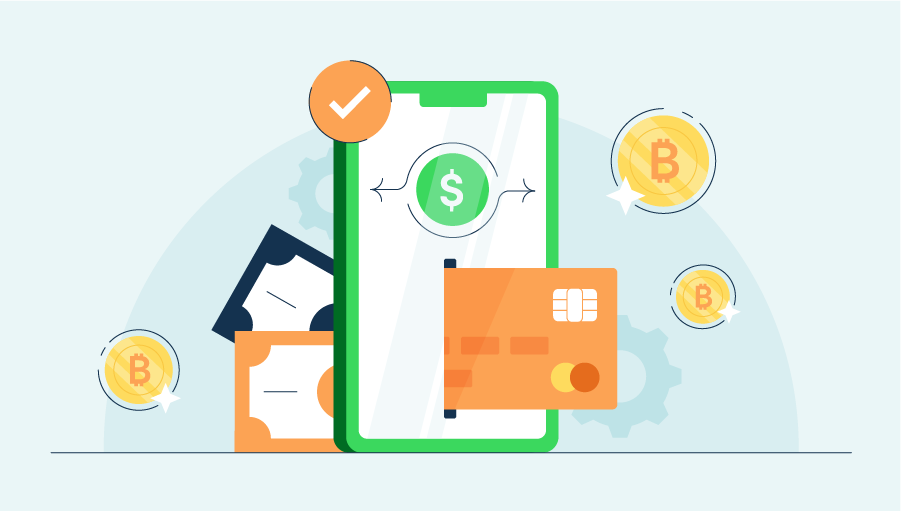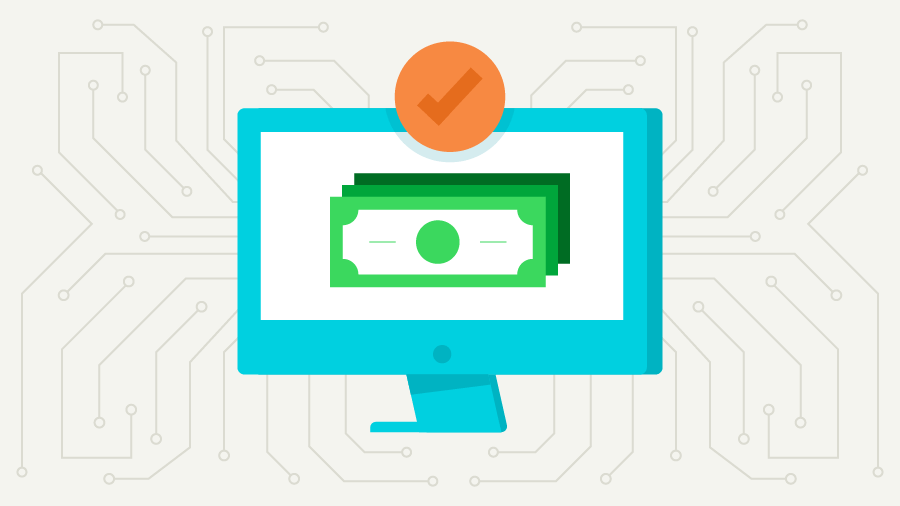

What’s the best payment method for small businesses? Some say cash is king, while others swear by credit cards. But in light of the coronavirus, small business owners may have had to forgo their preferred payment method and switch to online payments.
But ultimately, the best small business payment method will depend on a variety of factors. As you think about the best method, consider the size of your transactions, who’s handling the money, and your accounting system.
Let’s explore the payment options and payment processing tools that may fit your company.

The first thing you’ll need to decide is which types of payment your business can accept. Generally speaking, there are five payment options to choose from:
Consumers make cash payments with bills and coins. Typically, you manage cash payments from a point-of-sale system. Until recent years, cash had been a primary form of payment, but digital payment options have steadily increased in popularity.
The benefits of accepting cash payments include receiving payment immediately rather than waiting for a transaction to clear. Cash payments also cut down on overhead costs because there are no fees associated with accepting cash from customers. For small businesses with slim profit margins, credit card fees can be costly.
Running a cash-only business may help some small businesses improve bottom lines and simplify responsibilities. But it’s important to note that this type of payment comes with drawbacks. With a cash-only business, you may run a higher risk of theft and mismanaged money. There’s also a chance you could also lose business by inconveniencing customers who only have a card.
Regardless of your industry, if cash is your preferred payment method, you can avoid an audit with diligent accounting.

With market-leading APY, no monthly fees, and seamless payments—QuickBooks Money works harder for those who work for themselves.**
Start hereChecks are documents that authorize banks to transfer funds from your customer’s bank account to your business bank account . Checks document the payment amount and date and the payer’s account number and signature to authorize payment to the recipient.
Paper checks piqued in the 20th century. But they have lost some of their popularity with the widespread adoption of electronic payment systems. eChecks, electronic alternatives to paper checks , are now commonly used to make online payments.
But checks aren’t entirely outdated. They’re common among small business owners who own rental properties and lawn service companies, for example. All you need is a business bank account to start accepting check payments. But the SBA suggests creating a policy for your protection .
Standard practice is to accept check payments written in the exact amount and issued by major banks in your state. A third-party company can help verify the legitimacy of each check. But if a check bounces, you could wind up in small claims court or using a collection agency to recover your losses. Both results can be expensive and don’t guarantee repayment.
eChecks have become increasingly popular, along with ACH transfers from one financial institution to another.
Whether it’s a debit or credit card, plastic has become the primary way consumers pay for purchases today. Paying with cards is convenient and can facilitate a smoother checkout process. Plus, it allows people to finance large transactions, so most customers expect businesses to accept at least one type of card.
This type of payment benefits small business owners , too. Card payments broaden your customer base and legitimize your company. And in most cases, card payments deposit into your small business bank account quickly, so they can help improve your cash flow. But this type of payment method comes at a cost for small business owners.
The Durbin Amendment caps debit card transaction fees to help make processing debit card payments more affordable to sellers and consumers. The Durbin Amendment set the fee cap for debit transactions at 0.05% of the purchase amount, plus 22¢. However, the amendment doesn’t impact credit card transaction fees, which can cost sellers significantly more.
Credit card transaction fees, flat fees, and incidental fees can significantly impact your bottom line unless you pass the expense to consumers. Each company sets its rate, with Visa and Mastercard leading the way, followed by American Express and Discover. You’ll need to cover the costs of the physical equipment and pay for merchant services and PCI compliance charges. And you might face monthly minimums.
Consumers have the right to dispute credit card charges if they’re unhappy with your product. Chargebacks can debit your account without warning, and when margins are tight, they can send your small business into the red. Some banks hold merchants responsible for credit card fraud, which adds another expensive liability, especially if your reputation is tarnished as a result.
Despite the drawbacks, credit card payments have some benefits compared to alternative payment methods, particularly security, hygiene, and customer preferences.
Online payments transfer electronically. They use a payment gateway to facilitate and authorize several types of payments, including eChecks, credit cards, and direct debit payments.
Online payments aren’t restricted to online businesses. Online purchases can occur in brick-and-mortar stores using digital wallets, or apps that store credit and debit card information on a mobile device.
Online payments seem to be the way of the future in terms of cost and convenience. They offer a cheaper and faster way to get paid, and they give consumers options when they check out.
Cash and credit card sales require you to tally up the total price, including taxes. But the best online payment methods do this automatically, saving you time and reducing the risk of error. You’ll need to pay fees to accept payments online. But these fees are generally more affordable than those charged by credit card companies.
E-commerce online payment services often utilize a virtual shopping cart to calculate the total with shipping costs. That’s in addition to collecting the customer’s shipping and payment information. Several providers offer free shopping cart services to small businesses. You must have this type of payment to sell products or services online. But the ease and affordability have made them more popular among brick-and-mortar retailers, too. Digital wallets, as well as smart debit and credit cards, can enable contactless payments, which use near-field communications with card reader equipment to facilitate in-person payments.
Digital wallets, like Apple Pay or Google Pay, are going mainstream, especially among younger consumers. The change indicates a tipping point for online payments wherein the advent of digital wallets is around the corner.
Mobile payments use mobile devices, such as smartphones or tablets. Mobile payments can encompass a range of payment options, including:
Mobile payments facilitate mobile transactions using a method of payment, like cards or electronic money transfers.

No matter how your customers choose to settle up, track payments in one place and make managing your business finances easier than ever.
Start hereOnline payments are an emerging technology that can help you gain more customers, cut expensive costs, and simplify accounting processes. But it’s smart to compare the best online payment methods for small businesses to find the right solution for your needs.
A few major players dominate the credit card processing industry. But many providers can help your company process payments online, and they’re all structured differently.
There are five features you’ll want to look out for when comparing the best online payment providers.
Let’s compare several online payment processors for small businesses. You can see how some of the most popular choices stack up against each other and who they’re best for.
PayPal is one of the biggest names in online payments, with over 346 million customers . Its big reputation has earned businesses’ and consumers’ trust for security and risk management.
PayPal has a range of features for businesses looking for standard payment processing. PayPal offers ways to accept payments both online and in-person. You’ll need to check with your shopping cart provider or e-commerce platform to confirm whether PayPal checkout is compatible with your site.
PayPal users can pay using their PayPal account balance, PayPal CREDIT, a debit or credit card, or a bank account.
If you’re selling goods or services through an online transaction in the U.S., you’ll pay a merchant fee of 2.99% of the transaction amount and a 49¢ fixed fee. Micropayments under $10 are subject to a fee of 5% of the transaction amount, plus a fixed fee based on the currency.
Depending on the size of your transactions, this payment method could be expensive for your small business.
Venmo is known for processing peer-to-peer (P2P) payments, but the app also has a business side. Their social commerce platform can help build brand awareness because users can see, like, and comment on each other’s purchases.
Venmo can be a good choice for street vendors who need a way to accept cashless payments. Users can quickly scan a QR code linked to your business account and send money to complete a sale. These payments come with instant confirmation of funds. You can also integrate Venmo as a checkout option on your app or website.
To pay with Venmo, users must link their bank accounts or debit cards. Credit cards are subject to an additional charge . This payment method could deter customers who want to pay off purchases over time. Users can make payments using their Venmo balance, bank account, debit cards, and credit cards.
For business transactions made through a Venmo business profile, you’ll pay a merchant fee of 1.9% + a fixed 10¢ fee. There are no setup fees or monthly subscription costs. However, there is a fee for electronic withdrawals using the Instant Transfer feature. If you want immediate access to your money, you will pay a fee of 1% (minimum 25¢, maximum $10).
QuickBooks Payments is one of the most dynamic online payment methods for small businesses. It’s capable of streamlining a variety of accounting processes to save you time. You can access QuickBooks Payments by signing up for QuickBooks Money or QuickBooks Online.
QuickBooks Payments offers a solution for small businesses in every industry, including online and brick-and-mortar retailers.
QuickBooks Online with QuickBooks Payments integrates seamlessly with platforms like Shopify, BigCommerce, and similar web stores. When you complete a sale, QuickBooks Online calculates sales tax, processes the payment, creates a sales receipt, and records the transaction. You can also enjoy more peace of mind with security fraud protection and secure 128-bit encryption.
Additionally, QuickBooks offers a simple way to accept payments from anywhere using their mobile app . If you need to take credit card payments over the phone, you can use their virtual credit card terminal . Own a brick-and-mortar store? Accept payments using the QuickBooks card reader , capable of complete POS integration . You can also send invoices with an optional “Pay Now” option for built-in payment processing that can help you get paid 4x faster. 1
QuickBooks Payments connects seamlessly to QuickBooks Online and QuickBooks Checking, so you can manage your business money from one place.
QuickBooks Payments allows you to accept payments from customers via PayPal, Venmo, Apple PayⓇ, credit, debit or ACH bank transfer. And you can choose how customers pay. For example, if you’d like to receive a bank transfer for an invoice of $500, simply turn off the card option.
With QuickBooks Online and QuickBooks Payments, you can also accept in-person payments using a card reader .
QuickBooks is one of the best payment options for small businesses because they charge one simple rate when using the card reader. QuickBooks charges 2.5% per swipe, dip, or tap for Visa, Mastercard, American Express, and Discover. Customers can also pay using digital wallets, including Apple Pay, Google Pay, or Samsung Pay. Funds arrive in your bank account right away, ensuring you get paid quickly.
If you’re selling online, invoices or quick requests paid using Visa, Mastercard, Discover, American Express, Apple Pay, PayPal, or Venmo cost 2.99%. Keyed in card transactions, payments processed by manually entering a customer’s card information using the QuickBooks GoPayment app, cost 3.5%. ACH bank transfers, direct from the customer’s bank account to yours, cost just 1%.
Most importantly, there are never any upfront expenses, hidden costs, or termination fees.
Ultimately, the payment methods you accept at your business will depend on your business model and your customers. The best payment solutions for your small business should be affordable and capable of integrating with your accounting software. Offering a variety of payment options to customers may help boost your cash flow.
You can back your business with powerful tools using QuickBooks Payments, paired with Intuit’s best-in-class accounting software .

Add a Pay Now button to your invoices and let customers pay online 4x faster than with paper invoices.
Start hereQuickBooks Payments: QuickBooks Payments account subject to eligibility criteria, credit, and application approval. Subscription to QuickBooks Online required. Money movement services are provided by Intuit Payments Inc., licensed as a Money Transmitter by the New York State Department of Financial Services. For more information about Intuit Payments' money transmission licenses, please visit https://www.intuit.com/legal/licenses/payment-licenses/.
QuickBooks Money: QuickBooks Money is a standalone Intuit offering that includes QuickBooks Payments and QuickBooks Checking. Intuit accounts are subject to eligibility criteria, credit, and application approval. Banking services provided by and the QuickBooks Visa® Debit Card is issued by Green Dot Bank, Member FDIC, pursuant to license from Visa U.S.A., Inc. Visa is a registered trademark of Visa International Service Association. QuickBooks Checking Deposit Account Agreement applies. Banking services and debit card opening are subject to identity verification and approval by Green Dot Bank. Money movement services are provided by Intuit Payments Inc., licensed as a Money Transmitter by the New York State Department of Financial Services. For more information about Intuit Payments' money transmission licenses, please visit
https://www.intuit.com/legal/licenses/payment-licenses/. No subscription cost or monthly fees. Other fees and limits, including transaction-based fees, apply.
Industry-leading Annual Percentage Yield (APY): Competitive rate information based on publicly available data for small business checking accounts provided by the largest national and online banks as of September 18, 2023. APYs are subject to change at any time.
Apple Pay: Apple Pay is a registered trademark of Apple Inc.
Google Pay: Google Pay is a trademark of Google LLC.
QuickBooks Card Reader: Data access subject to cellular/internet provider network availability and occasional downtime due to system and server maintenance. Separate purchase, product registration and QuickBooks Payments account required. Terms, conditions, and features subject to change.
Claims
1 “Get paid 4x faster”: 'Four times faster’ based on U.S. customers using QuickBooks Online invoice tracking and payment features, compared to customers not using these features, from Aug 2022 to Jul 2023.
Recommended for you
Digital payments: A small business guide
November 16, 2023

What is days sales outstanding? How to calculate and improve DSO

What is an electronic payment? How and when to use them
November 14, 2023
We provide third-party links as a convenience and for informational purposes only. Intuit does not endorse or approve these products and services, or the opinions of these corporations or organizations or individuals. Intuit accepts no responsibility for the accuracy, legality, or content on these sites.
**Product information
QuickBooks Live Assisted Bookkeeping: This is a monthly subscription service offering ongoing guidance on how to manage your books that you maintain full ownership and control. When you request a session with a Live Bookkeeper, they can provide guidance on topics including: bookkeeping automation, categorization, financial reports and dashboards, reconciliation, and workflow creation and management. They can also answer specific questions related to your books and your business. Some basic bookkeeping services may not be included and will be determined by your Live Bookkeeper. The Live Bookkeeper will provide help based on the information you provide.
QuickBooks Live Full-Service Bookkeeping: This is a combination service that includes QuickBooks Live Cleanup and QuickBooks Live Monthly Bookkeeping.
1. QuickBooks Online Advanced supports the upload of 1000 transaction lines for invoices at one time. 37% faster based off of internal tests comparing QuickBooks Online regular invoice workflow with QuickBooks Online Advanced multiple invoice workflow.
2. Access to Priority Circle and its benefits are available only to customers located in the 50 United States, including DC, who have an active, paid subscription to QuickBooks Desktop Enterprise or QuickBooks Online Advanced. Eligibility criteria may apply to certain products. When customers no longer have an active, paid subscription, they will not be eligible to receive benefits. Phone and messaging premium support is available 24/7. Support hours exclude occasional downtime due to system and server maintenance, company events, observed U.S. holidays and events beyond our control. Intuit reserves the right to change these hours without notice. Terms, conditions, pricing, service, support options, and support team members are subject to change without notice.
3. For hours of support and how to contact support, click here.
4. With our Tax Penalty Protection: If you receive a tax notice and send it to us within 15-days of the tax notice we will cover the payroll tax penalty, up to $25,000. Additional conditions and restrictions apply. See more information about the guarantee here: https://payroll.intuit.com/disclosure/.
Terms, conditions, pricing, special features, and service and support options subject to change without notice.
QuickBooks Payments: QuickBooks Payments account subject to eligibility criteria, credit, and application approval. Subscription to QuickBooks Online required. Money movement services are provided by Intuit Payments Inc., licensed as a Money Transmitter by the New York State Department of Financial Services. For more information about Intuit Payments' money transmission licenses, please visit https://www.intuit.com/legal/licenses/payment-licenses/.
QuickBooks Money: QuickBooks Money is a standalone Intuit offering that includes QuickBooks Payments and QuickBooks Checking. Intuit accounts are subject to eligibility criteria, credit, and application approval. Banking services provided by and the QuickBooks Visa® Debit Card is issued by Green Dot Bank, Member FDIC, pursuant to license from Visa U.S.A., Inc. Visa is a registered trademark of Visa International Service Association. QuickBooks Money Deposit Account Agreement applies. Banking services and debit card opening are subject to identity verification and approval by Green Dot Bank. Money movement services are provided by Intuit Payments Inc., licensed as a Money Transmitter by the New York State Department of Financial Services.
QuickBooks Commerce Integration: QuickBooks Online and QuickBooks Commerce sold separately. Integration available.
QuickBooks Live Bookkeeping Guided Setup: The QuickBooks Live Bookkeeping Guided Setup is a one-time virtual session with a QuickBooks expert. It’s available to new QuickBooks Online monthly subscribers who are within the first 30 days of their subscription. The QuickBooks Live Bookkeeping Guided Setup service includes: providing the customer with instructions on how to set up chart of accounts; customized invoices and setup reminders; connecting bank accounts and credit cards. The QuickBooks Live Bookkeeping Guided Setup is not available for QuickBooks trial and QuickBooks Self Employed offerings, and does not include desktop migration, Payroll setup or services. Your expert will only guide the process of setting up a QuickBooks Online account. Terms, conditions, pricing, special features, and service and support options subject to change without notice.